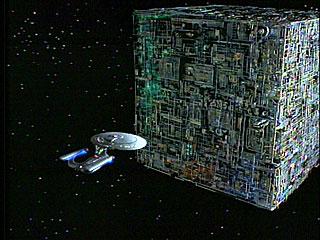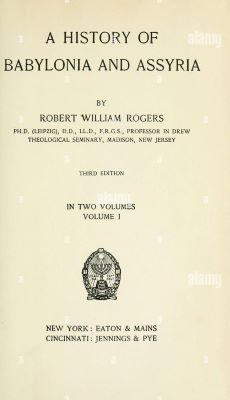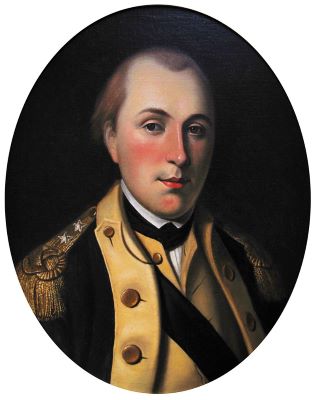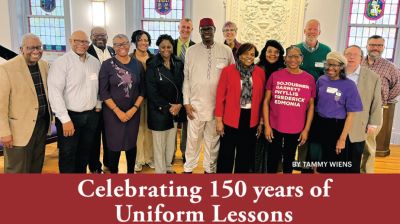
The Borg were a fearsome enemy in the Star Trek universe. They were in numerous episodes of Star Trek the Next Generation and Voyager. They always appeared as the dominant power on the verge of assimilating the starship crews into their collective. Their tag line was “Resistance is futile.” Yet somehow the starships not only did resist but did so successfully. Resistance was not futile.
Everything about the Borg was the antithesis to the Federation of Planets and therefore to the United States of America. We prefer the stylistically sleek and sexy lines in our cars, our ships, and our planes. By contrast the Borg vessel is a clunky metallic cube of no aesthetic appeal whatsoever. They are a society devoid of art in any shape or form except dull metallic grey.
But it is in the organization of the societies where the two ways of life demonstrate the most marked contrast. In the Borg, everything is the collective. There is no individuality. Once a being has been assimilated into the collective, individuality is lost. The Borg have no individual possessions or thoughts. They have a perfection in the order of the collective. They have banished individuality from their cubes and lives.
The dialog between the societies based on the starship and cube models express this difference. In the early episodes, the Borg spoke in a single voice that was a composite of all the voices of the assimilated beings in the hive. They had designations not names. In one episode, a Borg liberated from the collective became known as “Hugh” from “you.” In a longer running thread, the Borg who joined the Voyager crew by accident went from having a designation Seven of Nine for her place in the hive to being named Seven. The ongoing thread of this series focused on the travails and pitfalls of her becoming an individual, of being in touch with her humanity, of connecting to her childhood before she was assimilated.
I thought about the Borg when reading about recent developments in Hong Kong. I did so triggered by the title of an article “Can Hong Kong’s Resistance Win? (NYT July 14, 2019, the day the American President formally launched the culture wars against disloyal traitor Americans of color). Part of the article made me wonder if the author had the Borg in mind when contrasting China and Hong Kong.
If human beings have other wants or needs ⸺ like independent thinking, free expression or person happiness ⸺ well, those are things for our rivals, the Western democracies to pursue. The West’s production model is less efficient than ours. Ours has “Chinese characteristics.”
In these words, one may witness the Borg/Federation conflict in earthly human form. In the TV series resistance was not futile. Will the same be true for Hong Kong?
In this confrontation one should recognize that China has its own Hannitys and Huckabees. It has its own propaganda machine that even surpasses Fox. The Chinese and the Trumpicans both get their news from a single source – the government-approved propaganda machine. However Americans have alternatives with the Fake News outlets. In fact they are earning record profits. Fox and the President mention the other news sources if only to belittle them. By contrast, China has no homegrown alternative to the official propaganda outlet.
However that does not mean the Chinese are not graduates of the Laura Ingraham School of Spin. As one Chinese professor said in support of the Chinese government against the Hong Kong Spring:
They are obviously actors, not Hong Kong citizens.
Ingraham could not have said it better herself. In fact, she has said it. Something about children separated from their families at the border having a camp-like experience. And all those supposed “high school” students after the shooting at Marjory Stoneman Douglas High School in Parkland, Florida.
One danger for the Chinese government is that the longer the Hong Kong Spring continues, the greater the demands are likely to be. For the moment they are contained to specific grievances relating to specific proposed laws and the actions of the police against those participating in the Hong Kong Spring. But over time, the stakes rise. A protester climbed a flagpole, removed the Chinese national flag, and flung it into the water. Another protester than unfurled a flag in support of Hong Kong independence. Shades of Evacuation Day on November 25, 1783, at Bowling Green when a Dutch American climbed the British-greased flagpole, tore down the British flag, and raised an American flag. As the Chinese protester said:
We’re losing our freedom little by little. Those who don’t support Hong Kong independence will have no choice but to become Chinese.
The call for independence ratchets up the division and makes cooperation more difficult. It also suggests a distinction between the Chinese people and the Hong Kong people, as if two different races or ethnicities are involved.
Back in 2018, before all the current commotion began, a new bridge was opened that linked Hong Kong and Macau. A prescient article “New Bridge Brings ‘That Kind of Tourist’ to Hong Suburb” (NYT, November 24, 2018, print edition) highlighted that difference. In the first month, nearly one million mainland Chinese crossed over into Hong Kong with the corresponding reaction by the locals to what our president would call an “invasion,’ even if they do return home after a day of shopping. The authors noted:
It’s an early sign that it will take more than a 34-mile megastructure to overcome the resentment that is festering between Hong Kong residents and mainland Chinese.
The article reports that activists who claim Hong Kong has a unique identity that needs to be protected are called “localists.” They advocate for independence, an increasingly taboo subject. The localists differentiate themselves from mainland Chinese. They do so by employing derogatory language. They call the mainlanders “locusts” [not “animals’] and “invaders.” By American standards, these localists in support of Hong Kong independence are using racist language. They compound the derision by referring to the people of China as being from “Chee-na” instead of “China.”
Pro-Chinese people understand the insults and have responded in opposition to such castigation of mainland Chinese. As one individual said:
We’re all Chinese people with yellow skin. Why are you discriminating against your own people?
So the pro-freedom and independence people use demeaning language to belittle and mock the locusts who invade their land and overwhelm their communities. The pro-government people refers to the Asian people of color as “yellow.”
Nonetheless, the position of our government on the Hong Kong Spring is clear. Our transactional President who alienates allies prefers authoritarian leaders to freedom seekers. The message the Chinese government should deliver is “Love it or Leave it!” And if the residents of Hong Kong do decide to leave it, they cannot come here. They are not Norwegian. They are people of color. And we are full up. So where should they go? What country would welcome them in the face of China’s wrath if they did? Taiwan?
At this point, no one knows how the story of the Hong Kong Spring will end. The Chinese government has the option to accede to the demands of the protesters and simply wait. After all, in 2047 by treaty the two-system approach will cease. China will then be legally allowed to absorb Hong Kong into the mainland collective. Of course, people living in Hong Kong today know about 2047. Many of them will be alive then. So even though 2047 is 28 years away, for the localists the protests now may be the last opportunity to preserve their freedom. The stakes are high and they have nowhere to turn for help. Perhaps in this real-world drama, resistance is futile and the Borg collective trumps the desire of those who want to be free.





